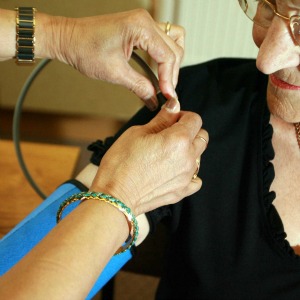GPs should aim for lower blood pressure targets in elderly patients, say researchers

Aiming for blood pressure targets of 120mmHg systolic in hypertensive patients aged over 75 reduces mortality and cardiovascular events, claim researchers.
Patients who were treated to a systolic blood pressure (SBP) of 120mmHg had a 33% reduced incidence of cardiovascular disease, compared with patients treated to a blood pressure of 140mmHg. The absolute risk of cardiovascular disease events in the intensive treatment group was 2.6% compared with 3.9% in the standard treatment group.
Treating to 120mmHg also led to a 32% reduction in mortality compared with treating to 140mmHg, with the rate of deaths 1.8% compared with 2.6%, respectively.
The results, published in JAMA, were part of data from the SPRINT trial, a US study looking at systolic blood pressure in patients over 50 years. This new data looked at a subset of that population, focusing on patients aged 75 years or older.
Participants were chosen for the trial if they were over 75 and had an increased risk for cardiovascular disease – but not if they had diabetes, or a history of stroke or heart failure within the past six months – and were split into two target blood pressure groups.
Patients in the 120mmHg group were intensively treated to reach the target blood pressure whereas those in the 140mmHg group received standard treatment. On average, one additional antihypertensive drug was needed to reach the lower blood pressure target.
Concluding in the paper, the team write: ‘Among ambulatory adults aged 75 years or older, treating to an SBP target of less than 120mmHg compared with an SBP target of less than 140mmHg resulted in significantly lower rates of fatal and non-fatal major cardiovascular events and death from any cause.’
The results follow other findings from the SPRINT trial that concluded a target blood pressure of 120mmgHg reduces cardiovascular mortality in people aged over 50. NICE are said to be considering the results and are currently reviewing their guidance on hypertension.
Pulse July survey
Take our July 2025 survey to potentially win £1.000 worth of tokens

Visit Pulse Reference for details on 140 symptoms, including easily searchable symptoms and categories, offering you a free platform to check symptoms and receive potential diagnoses during consultations.













